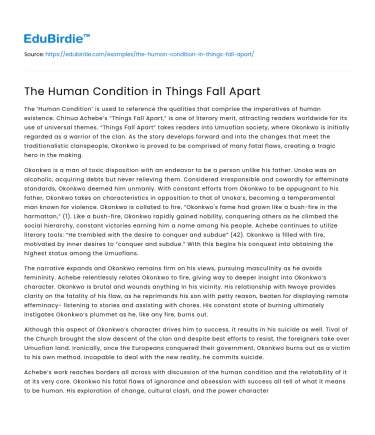The ‘Human Condition’ is used to reference the qualities that comprise the imperatives of human existence. Chinua Achebe’s “Things Fall Apart,” is one of literary merit, attracting readers worldwide for its use of universal themes. “Things Fall Apart” takes readers into Umuofian society, where Okonkwo is initially regarded as a warrior of the clan. As the story develops forward and into the changes that meet the traditionalistic clanspeople, Okonkwo is proved to be comprised of many fatal flaws, creating a tragic hero in the making.
Okonkwo is a man of toxic disposition with an endeavor to be a person unlike his father. Unoka was an alcoholic, acquiring debts but never relieving them. Considered irresponsible and cowardly for effeminate standards, Okonkwo deemed him unmanly. With constant efforts from Okonkwo to be oppugnant to his father, Okonkwo takes on characteristics in opposition to that of Unoka’s, becoming a temperamental man known for violence. Okonkwo is collated to fire, “Okonkwo's fame had grown like a bush-fire in the harmattan,” (1). Like a bush-fire, Okonkwo rapidly gained nobility, conquering others as he climbed the social hierarchy, constant victories earning him a name among his people. Achebe continues to utilize literary tools: “He trembled with the desire to conquer and subdue” (42). Okonkwo is filled with fire, motivated by inner desires to “conquer and subdue.” With this begins his conquest into obtaining the highest status among the Umuofians.
Save your time!
We can take care of your essay
- Proper editing and formatting
- Free revision, title page, and bibliography
- Flexible prices and money-back guarantee
The narrative expands and Okonkwo remains firm on his views, pursuing masculinity as he avoids femininity. Achebe relentlessly relates Okonkwo to fire, giving way to deeper insight into Okonkwo’s character. Okonkwo is brutal and wounds anything in his vicinity. His relationship with Nwoye provides clarity on the fatality of his flaw, as he reprimands his son with petty reason, beaten for displaying remote effeminacy- listening to stories and assisting with chores. His constant state of burning ultimately instigates Okonkwo’s plummet as he, like any fire, burns out.
Although this aspect of Okonkwo’s character drives him to success, it results in his suicide as well. Tival of the Church brought the slow descent of the clan and despite best efforts to resist, the foreigners take over Umuofian land. Ironically, once the Europeans conquered their government, Okonkwo burns out as a victim to his own method. Incapable to deal with the new reality, he commits suicide.
Achebe’s work reaches borders all across with discussion of the human condition and the relatability of it at its very core. Okonkwo his fatal flaws of ignorance and obsession with success all tell of what it means to be human. His exploration of change, cultural clash, and the power character holds all compile together in a profound work of human evaluation.






 Stuck on your essay?
Stuck on your essay?

